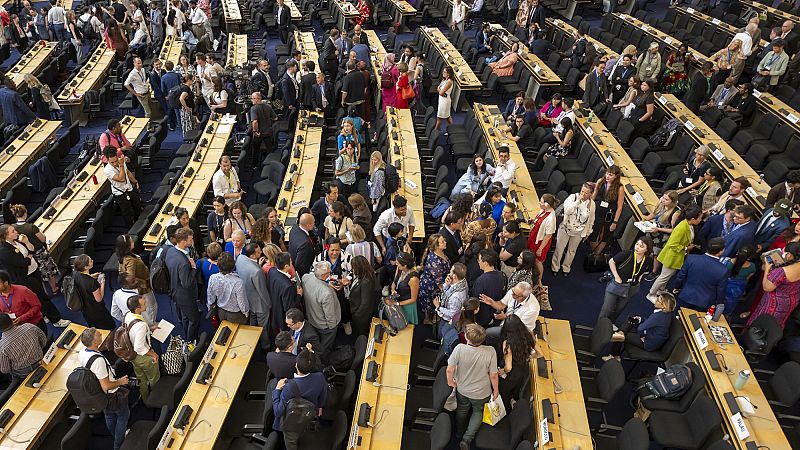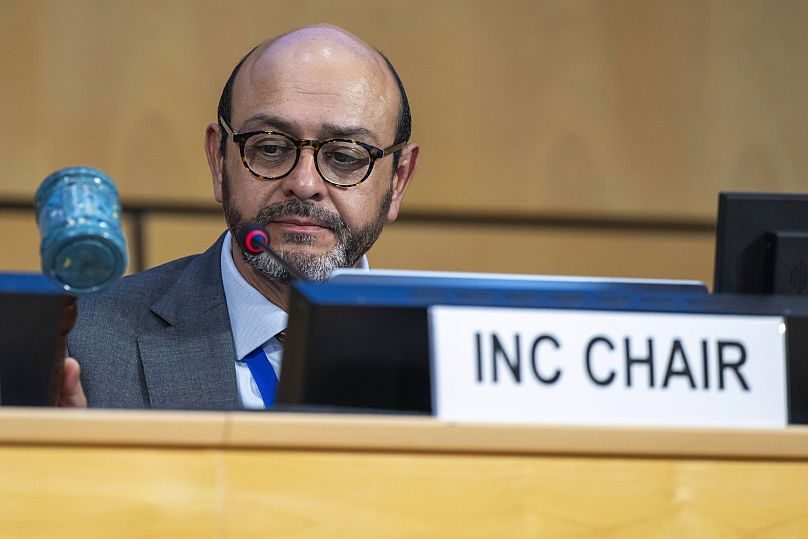'Abject failure': Talks on landmark plastics treaty end in Geneva with no agreement

Negotiators working on a treaty to address the global crisis of plastic pollution won’t reach an agreement in Geneva on Friday.
They were meeting for the 11th day at the United Nations office in Geneva to try to complete a landmark treaty to end the plastic pollution crisis but remained deadlocked over whether the treaty should reduce the exponential growth of plastic production and put global, legally binding controls on toxic chemicals used to make plastics.
This round of negotiations was meant to be the last, producing the first legally binding treaty on plastic pollution. But now delegates are leaving without a treaty after talks collapsed, just like they did at the meeting in South Korea last year.
Nations deeply disappointed to leave Geneva without a treaty
Representatives of Norway, Australia, Tuvalu and other nations said they were deeply disappointed to be leaving Geneva without a treaty.
"We came to Geneva to secure a global plastics treaty because we know the stakes could not be higher," European Commissioner for Environment, Water Resilience and Competitive Circular Economy, Jessika Roswall said in a post on social media.
"While the latest text on the table does not yet meet all our ambitions, it is a step forward—and the perfect must not be the enemy of the good."
Roswall added that the EU will continue to push for a stronger, binding agreement.
"I am disappointed, and I am angry," France's Minister for Ecological Transition, Agnès Pannier-Runacher, said.
"I am disappointed because a handful of countries, guided by short-term financial interests rather than the health of their populations and the sustainability of their economies, blocked the adoption of an ambitious treaty against plastic pollution. Yet the scientific and medical evidence is overwhelming: plastic kills. It poisons our oceans, our soils, and ultimately, it contaminates our bodies.
"And I am angry because France, together with the European Union and a coalition of more than 100 countries from every continent — developed and developing, determined and ambitious — did everything possible to obtain an agreement that meets the urgency of the moment: to reduce plastic production, ban the most dangerous products, and finally protect the health of our populations."
Saudi Arabia said both drafts lacked balance, and Saudi and Kuwaiti negotiators said the latest proposal takes other states' views more into account and addresses plastic production, which they consider outside the scope of the treaty.
No further action on the latest draft text
Luis Vayas Valdivieso, the chair of the negotiating committee, wrote and presented two drafts of treaty text in Geneva based on the views expressed by nations at the talks.
That draft, released early Friday, did not include a limit on plastic production but recognised that current levels of production and consumption are “unsustainable” and global action is needed. New language had been added to say these levels exceed current waste management capacities and are projected to increase further, “thereby necessitating a coordinated global response to halt and reverse such trends.”
The objective of the treaty was revamped to state that the accord would be based on a comprehensive approach that addresses the full lifecycle of plastics. It talked about reducing plastic products containing “a chemical or chemicals of concern to human health or the environment,” as well as reducing single-use or short-lived plastic products.
It was a much better, more ambitious text, though not perfect. But each country came to Geneva with a lot of “red lines,” said Magnus Heunicke, the Danish environment minister. Denmark holds the rotating presidency of the Council of Europe.
“To be very clear, a compromise means that we have to bend our red lines,” he said.
The representatives from 184 countries did not agree to use either one as the basis for their negotiations. Valdivieso said Friday morning, as the delegates reconvened in the assembly hall, that no further action is being proposed at this stage on the latest draft.
After a three-hour meeting, he banged a gavel made of recycled plastic bottle tops from a Nairobi landfill. He said the session was adjourned to be resumed at a later date.
David Azoulay, health programme director and head of the delegation for the Center for International Environmental Law, said in a statement that talks in Geneva have been an "abject failure".
"In the final days of the negotiations, we have clearly seen what many of us have known for some time - some countries did not come here to finalise a text, they came here to do the opposite: block any attempt at advancing a viable treaty.
"It’s impossible to find a common ground between those who are interested in protecting the status quo and the majority who are looking for a functional treaty that can be strengthened over time."
What happens now?
United Nations Environment Programme chief, Inger Andersen, told journalists in Geneva on Friday morning that it was "very clear that we did not arrive where we wanted to arrive".
"But despite those profound challenges that were journeyed, despite the profound disappointment that we all leave with, we have to accept that significant progress was made."
She added that this progress had been made in discussions and clarifying nations' red lines.
For any proposal to make it into the treaty, every nation must agree. India, Saudi Arabia, Iran, Kuwait, Vietnam and others have said that consensus is vital to an effective treaty. Some countries want to change the process so decisions may be made by a vote if necessary.
Graham Forbes, head of the Greenpeace delegation in Geneva, urged delegates in that direction.
“We are going in circles. We cannot continue to do the same thing and expect a different result,” he said as Friday's meeting was ending.
Azoulay said that, while negotiations will continue, they will fail again if solutions aren't identified and the process doesn't change.
"We need a restart, not a repeat performance. Countries that want a treaty must now leave this process and form a treaty of the willing. And that process must include options for voting that deny the tyranny of consensus we have watched play out here."


